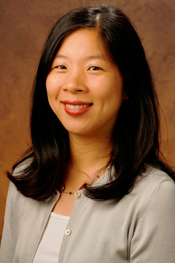Home » News » Meet the Vanderbilt LGBT Policy Lab Faculty: Professor Cindy Kam
Meet the Vanderbilt LGBT Policy Lab Faculty: Professor Cindy Kam
Posted by anderc8 on Monday, February 5, 2018 in News, TIPs 2017.
Written by Stephanie Wang, Vanderbilt Class of 2021
As a way to introduce you to faculty from the LGBT Policy Lab, first-year student Stephanie Wang will interview a different faculty member approximately each month and write a brief faculty profile. Stephanie reached out to the Vanderbilt LGBT Policy Lab prior to her arrival on campus this fall, as she is passionate about the issues being addressed in the TIPS project. Stephanie arrived at Vanderbilt from Pittsburgh, where she was active in a political activism organization, a robotics team, the varsity swim team as well as several writing publications. She plans to major in Computer Science. At Vanderbilt, she writes for the Hustler, the Slant and the Vanderbilt Political Review. She is also involved with the Engineering Council and the Community Building, Outreach and Diversity Committee of Vanderbilt Student Government.
To inform each Vanderbilt LGBT Policy Lab faculty profile, Stephanie is asking a range of questions, such as: What is the faculty member’s background? How did the faculty member become interested in research on LGBT public policies? How are LGBT issues treated in the faculty member’s broader academic discipline? The fifth faculty member to be profiled in this series is Cindy Kam, William R. Kenan, Jr. Chair in Political Science.

Cindy Kam, William R. Kenan, Jr. Chair in Political Science.
A political scientist, Professor Cindy Kam is especially intrigued by public opinion and political psychology – she’s interested in how people come up with their opinions on important public issues.
Previously, much of her work has focused on intergroup relations and how people understand policies. She’s found that the way people understand policies aren’t just based on partisanship, ideology or values, but often by the groups of people implicated in those policies. In this work, she has concentrated on ethnocentrism – one’s predisposition to carve the world into “us” and “them” – and its effect on American public opinion.
In her book, Us Against Them, Professor Kam and her co-author Donald Kinder argue that there is a continuum in which people carve the world into “us” and “them,” and this level of ethnocentrism can predict public opinion across a variety of policies. Topics and policies tackled in her book include how ethnocentrism shapes how people feel about policies like military action, foreign aid, immigration, welfare, same-sex marriage and lesbian and gay rights. She has found that ethnocentric Americans – those who tend to carve the world into us and them – are significantly more likely to oppose gay marriage and less likely to support the liberalization of policies for sexual minorities. For example, Professor Kam found that ethnocentric Americans tended to disapprove of LGBT individuals serving in the military and legislation protecting LGBT individuals from workplace discrimination.
Professor Kam (along with VU PhD Beth Estes) has also looked into the role of disgust on public opinion, including how it shapes opinions on same-sex marriage and other policies relating to sexual minorities. Currently, in collaboration with graduate student James Martherus, she is studying the relationship between binary thinking and transgender policy opinions by developing a scale into which people engage in categorical thinking that reflects duality (for example, black/white, man/woman, good/bad, etc.) and investigating how those people who think in these binaries view transgender policies.
Professor Kam is also engaged in a number of projects on political psychology, political participation and public opinion. One project, in collaboration with graduate student Maggie Deichert, examines political consumerism: when do people decide to boycott or “boycott” (go out and intentionally buy from a company) because of its ethical, social or moral values? Through a set of experiments, she’s hoping to understand whether people are intentional in their personal purchasing decisions. She’s also working on a collaborative study with VU PhD Allison Archer (University of Richmond) on the #MeToo movement and sexual harassment policy opinions as well as a collaborative study with VU PhD Camille Burge (Villanova University) of racial attitudes among black and white Americans.
This spring, Professor Kam will present her work on binary thinking and transgender policy attitudes as part of a panel on public opinion and LGBT policy at the Midwest Political Science Association conference.
On why LGBT research is interesting to her, Professor Kam says, “As a political psychologist, I’m interested in intergroup relations. LGBT policies are fascinating because this is one domain in which public opinion has liberalized in an extremely quick, extremely hospitable way (at least in the historical perspective). Within the categories of different groups that are tied to policy, this is a fascinating case regarding how opinions have changed, but there many questions still remain, as policy and matters of public debate continue to evolve.”
